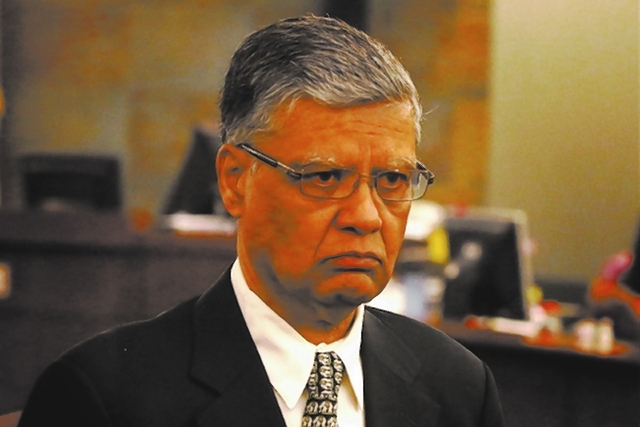Desai ran clinic like ‘assembly line,’ prosecutor says
Dr. Dipak Desai, the physician at the center of the hepatitis C outbreak, ran his main endoscopy clinic like an “assembly line,” pinching pennies and risking the health and safety of his patients, a prosecutor told a jury on Monday.
“They were moving through there like cattle,” Chief Deputy District Attorney Mike Staudaher said in his opening statement, as the trial of Desai and nurse anesthetist Ronald Lakeman got under way in District Court. “Patient care was relegated to the basement.”
Staudaher said Desai was double- and triple-booking patients at the Endoscopy Center of Southern Nevada and doing more than 60 procedures a day when the hepatitis C outbreak occurred in the summer of 2007.
In a two-hour presentation in the courtroom of District Judge Valerie Adair, the prosecutor said the long-awaited trial of the defendants is about a “fundamental breach” of one of the most intimate relationships a person can have — the relationship between a patient and doctor.
Dressed in a black suit, Desai sat motionless at the defense table, looking straight ahead and never glancing at the prosecutor as he spoke.
Defense lawyers will get a chance to address the jury today before prosecutors start their case.
Desai, 63, who gave up his medical license after health officials disclosed the outbreak in 2008, and Lakeman, 65, face a series of charges, including second-degree murder, criminal neglect of patients, theft, and insurance fraud.
Another nurse charged in the case, Keith Mathahs, 76, pleaded guilty and agreed to testify against Desai and Lakeman.
The murder charge stems from the death of Rodolfo Meana, 77, a victim of the hepatitis outbreak.
Health officials concluded Meana and five other patients contracted hepatitis C through unsafe injection practices on Sept. 21, 2007. Another patient was infected on July 25, 2007.
Several of those patients are expected to be among the prosecution’s first witnesses.
The outbreak was blamed on nurse anesthetists reusing vials of the sedative propofol between patients after the vials had become contaminated by patients with hepatitis C.
In his opening statement, Staudaher said clinic staffers got so used to lax injection practices that they did it out of habit in front of Centers for Disease Control investigators who had been summoned to observe the clinic in early 2008.
Staudaher said the hepatitis C outbreak here was the largest ever recorded in the nation.
The Southern Nevada Health District notified more than 63,000 residents — about 3.4 percent of the county’s population, Staudaher said — that they might have been exposed to the deadly virus .
Desai personally called all the shots at the clinic, sacrificing patient care “for pennies,” Staudaher said.
Desai, he said, had a “laser like focus on cost.”
Syringes, disposable forceps, bite blocks and single-use vials of propofol all were reused during procedures to save money, Staudaher told the jury.
Desai also instructed employees to cut back on the use of lubricants for scopes inserted into patients during procedures at the risk of patients’ safety, he said.
At times, the prosecutor said, Desai was so eager to move patients through the clinic that he would start a procedure before the sedative kicked in and would yank scopes out of patients at the end of a procedure, causing fecal matter to splash against the walls.
“A commodity, that’s all you are in that clinic,” Staudaher said.
As the prosecutor showed the jury a photo of Meana, he said the former Philippines veteran died a “horrible and regrettable death” from the virus he contracted at Desai’s clinic.
Desai performed the colonoscopy on Meana that led to the hepatitis infection, and Mathahs participated in the procedure.
Lakeman did not participate, but prosecutors contend he was culpable in Meana’s death under the theory of the murder charge, which alleges all three defendants were part of the conspiracy that endangered the lives of patients.
Desai, Lakeman and Mathahs were originally indicted in June 2010, but the case experienced several delays, primarily because of health issues surrounding Desai, who suffered several strokes in the aftermath of the outbreak.
Defense lawyers maintained from the start of the case that Desai is not competent to stand trial. But medical experts who observed him for six months at Nevada’s secure mental hospital in Northern Nevada concluded he has been exaggerating the effects of the strokes.
Contact Jeff German at jgerman@reviewjournal.com or 702-380-8135. Follow @JGermanRJ on Twitter.


















